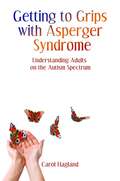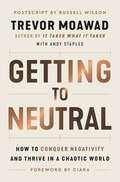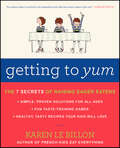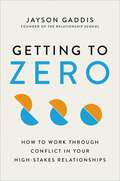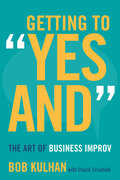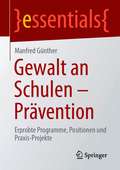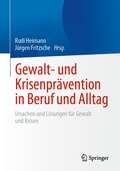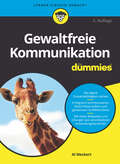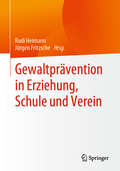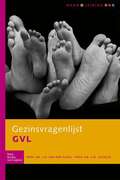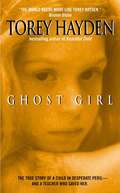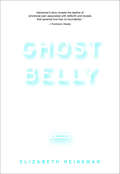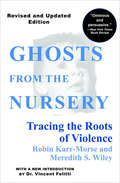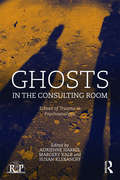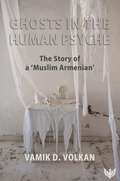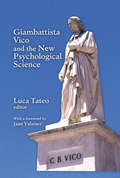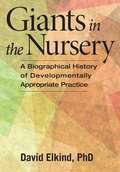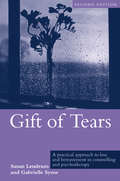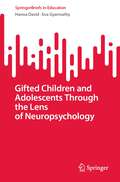- Table View
- List View
Getting to Grips with Asperger Syndrome
by Carol HaglandGetting to Grips with Asperger Syndrome is a practical, problem-solving guide for those caring for or supporting an adult with Asperger Syndrome (AS). It will help them understand the condition and the difficulties it may cause, so that they can offer support in the most beneficial way. The book explains what AS is and why certain behaviours frequently occur: such as anxiety, fear of change and unusual sensitivities. Once behaviours and reactions are understood, many of the apparent problems become less troublesome, and difficulties can be avoided or easily-resolved. Practical strategies are offered to combat problems that may arise, and common issues that specifically occur with individuals diagnosed later in life are addressed. Easy-to-read and accessible, this book is a useful reference for friends and family of individuals with AS, as well as health and social care staff and students, whatever the level of training and experience.
Getting to Neutral: How to Conquer Negativity and Thrive in a Chaotic World
by Trevor Moawad Andy StaplesForeword by CiaraIn this breakthrough book, the author of Wall Street Journal bestseller It Takes What It Takes provides life-changing, step-by-step guidance on how to successfully navigate adversity and defeat negativity by downshifting to neutral thinking. It’s easy to be positive when everything is coming up roses. But what happens when life goes sideways? Many of us lapse into a self-defeating negative spiral that makes it hard to accomplish anything. Getting to Neutral is a step-by-step guide that shows readers how to use mental conditioning coach Trevor Moawad’s innovative motivational system to defeat negativity and thrive.Neutral thinking is a judgment-free, process-oriented approach that helps us coolly assess situations in high-pressure moments. Moawad walks readers through how to downshift to neutral no matter how dire the situation. He shows us how to behave our way to success, how to determine and practice our values in a neutral framework, and how to surround ourselves with a team that helps us to stay neutral. Filled with raw, inspiring stories of how Trevor navigated health challenges with neutral thinking as well as insights drawn from some of the world’s best athletes, coaches, and leaders, Getting to Neutral will help readers learn to handle even the most complex and turbulent situations with calm, clarity, and resolve.
Getting to YUM: The 7 Secrets of Raising Eager Eaters
by Karen Le BillonFrom the author of the popular French Kids Eat Everything, a simple, easy and surprisingly fun way to change dinnertime reactions from YUCK to YUM.Are mealtimes with your kids a source of frustration? Ever wonder how on earth to get them to eat the recommended 5 servings of fruits and veggies per day (or even per week)?Getting to YUM is a practical and engaging guide for parents eager to get past their children's food resistance—or avoid it altogether. It introduces 7 Secrets of Raising Eager Eaters (Secret 1: Teach your child to eat, just like you teach them to read! or Secret 6: Teach me to do it myself: kid participation is every parent's secret weapon).Karen Le Billon, author of French Kids Eat Everything, coaches readers through the process of taste training, including strategies, games and experiments that will encourage even reluctant eaters to branch out. Over 100 delicious, kid-tested, age-appropriate recipes lead families step-by-step through the process of "learning to love new foods," enabling kids to really enjoy the foods we know they should be eating.Wise and compelling, Getting to YUM is grounded in revolutionary new research on the science of taste. Packed full of observations from real-life families, it provides everything parents need to transform their children—from babies to toddlers to teens—into good eaters for life.
Getting to Yes: Negotiating Agreement Without Giving In
by Roger Fisher Bruce Patton William L. UryINTERNATIONAL BESTSELLER • Learn the secret to successful negotiation with this proven, step-by-step strategy—now updated and revised. &“The authors have packed a lot of commonsensical observation and advice into a concise, clearly written little book.&”—Bloomberg BusinessweekOne of the key business texts of the modern era, Getting to Yes has helped millions of people learn a better way to negotiate. Based on the work of the Harvard Negotiation Project, a group that deals with all levels of negotiation and conflict resolution, it offers readers a straightforward, universally applicable method for reaching mutually satisfying agreements—at home, in business, and with people in any situation. Read Getting to Yes to learn, step-by-step, how to• disentangle the people from the problem• focus on interests, not positions• work together to find creative and fair options• negotiate successfully with anybody at any level
Getting to Zero: How to Work Through Conflict in Your High-Stakes Relationships
by Jayson GaddisThe counselor, teacher, and founder of The Relationship School reveals the origins of conflict styles, and how to stop avoiding and resolve conflict in relationships with loved ones.Conflicts in our closest relationships are scary because so much is at stake. If the conflict doesn't go well, we could lose our marriage, our family or our job, all connected to our security and survival. So we do just about anything not to lose those relationships, including avoid conflict, betraying ourselves or becoming dishonest. Unresolved conflict affects every single aspect of our lives, from self-confidence to physical and mental health.Jayson Gaddis is a personal trainer for relationships and one of the world&’s leading authorities on interpersonal conflict. For almost two decades, Gaddis has helped individuals, couples, and teams get to the bottom of their deepest conflicts. He helps people see the wisdom in conflict and how to get to zero—which means we have successfully worked through our conflict and have nothing in the way of a good connection.In Getting to Zero, Gaddis shows the reader how to stop running away from uncomfortable conversations and instead learn how to work through them. Through funny personal stories, uncomfortable examples, and effective tools and skills, he shows the reader how to move from disconnection to connection, acceptance, and understanding. This method upgrades the old tired and static conflict resolution approaches and offers a fresh, street-level, user-friendly road map on exactly how to work through conflict with the people you care most about.
Getting to “Yes And”: The Art of Business Improv
by Chuck Crisafulli Bob KulhanAmidst the deluge of advice for businesspeople, there lies an overlooked tool, a key to thriving in today's fast-paced, unpredictable environment: improvisation. In Getting to "Yes And" veteran improv performer, university professor, CEO, and consultant Bob Kulhan unpacks a form of mental agility with powers far beyond the entertainment value of comedy troupes. Drawing on principles from cognitive and social psychology, behavioral economics, and communication, Kulhan teaches readers to think on their feet and approach the most typical business challenges with fresh eyes and openness. He shows how improv techniques such as the "Yes, and" approach, divergent and convergent thinking, and focusing on being present can translate into more productive meetings, swifter decisions, stronger collaboration, positive conflict resolution, mindfulness, and more. Moving from the individual to the organizational level, Kulhan compiles time-tested teaching methods and training exercises into an instrumental guide that readers can readily implement as a party of one or a company of thousands.
Gewalt an Schulen - Prävention: Erprobte Programme, Positionen und Praxis-Projekte (essentials)
by Manfred GüntherDer spezielle Zugang zum Thema Gewalt an Schulen – Prävention in diesem essential besteht darin, in aller Kürze zu zeigen, welche schulbezogenen Präventionsprogramme heute, nach den Erfahrungen aus Erfurt und Winnenden, in den Bundesländern eingesetzt werden und welche davon evaluierte „good practice“ sind. Denn unentschieden ist, welche entwickelten Anti-Bullying-Pakete und welche Art Amok-Vorsorge möglichst überall zu implementieren sind. Was könnte anderseits in der „Eigenverantwortlichen Schule“ in Kooperation mit Schulsozialarbeit dezentral beschlossen und umgesetzt werden? Der Autor wirkte an Brennpunktschulen in Berlin-Kreuzberg und empfiehlt dringend Notfallpläne, „Mehrebenen-Projekte“ sowie Krisenteams.
Gewalt in der klinischen Geburtshilfe: Der Einfluss von Gewalterfahrungen unter der Geburt auf die postpartale Befindlichkeit von Müttern (BestMasters)
by Lisa FabianInwieweit beeinflusst die Geburtserfahrung das weitere Leben von Müttern? Die vorliegenden Forschungsergebnisse der postpartalen Psychologie lassen die Geburtserfahrung in einem völlig neuen Lichte erscheinen. Die Geburtserfahrung als solche und das Erleben der Mütter in dieser Situation haben nach diesen Erkenntnissen weitreichenden Einfluss auf das postpartale psychische Empfinden der Mütter und die Beziehung zum Kind.Die Autorin thematisiert unter anderem die psychischen Folgen eines belastenden Geburtserlebnisses und gibt Hinweise zu Handlungsempfehlungen für geburtshilfliches Personal.
Gewalt und Aggression: Forschung und Praxis
by Peter SturmeyDieses Buch bietet einen prägnanten und umfassenden Überblick über vielfältige Themen im Bereich von Gewalt und Aggression. Es verwendet einen funktionalen Ansatz, der die evolutionären, kulturellen und operanten Faktoren von Gewalt und Aggression darstellt. Das Buch zeigt Entstehungsfaktoren verschiedener Formen von Gewalt und Aggression, erläutert Epidemiologie und Risikofaktoren, beschreibt biologische, kulturelle und individuelle Ursachen und diskutiert individuelle sowie gesellschaftliche Möglichkeiten von Prävention und Therapie. Wichtige Themen umfassen: Epidemiologie von Gewalt und Aggression Biologische und soziale Ursachen von Gewalt und Aggression Kulturelle Interventionen, Psychotherapien und individuelle biologische Interventionen Die Auswirkungen von Gewalt und Aggression in besonderen Bevölkerungsgruppen Gewalt und Aggression: Forschung und Praxis ist eine unverzichtbare Ressource für Forscher, Akademiker sowie Studierende der höheren Semester in forensischer Psychologie Kriminologie/Strafjustiz, Entwicklungspsychologie, Psychotherapie/Beratung, Psychiatrie, öffentlichen Gesundheitseinrichtungen, Sozialarbeit, Bildungspolitik und -wissenschaften, Gesundheitspsychologie, Pflege sowie Verhaltenstherapie und Rehabilitation.
Gewalt- und Krisenprävention in Beruf und Alltag: Ursachen und Lösungen für Gewalt und Krisen
by Rudi Heimann Jürgen FritzscheDer Herausgeberband gibt einen anwenderorientierten Überblick zu Ursachen und Entwicklungen von Bedrohungen, Gewalt und daraus entstehender Krisen im beruflichen Kontext und im Alltag. Ein interdisziplinäres Autorenteam stellt neben den Grundlagen die wichtigsten Methoden zur Bewältigung sich entwickelnder und bereits offener Gewalt- und Krisensituationen vor. Der Schwerpunkt liegt im Anwendungsteil auf angemessener konfliktfreier Lösung und der konsequenten Verfolgung alternativer Möglichkeiten, wenn eine konfliktfreie Bewältigung nicht mehr möglich ist. Sicherheitskonzepten und praktikablen Deeskalationsmodellen wird ebenso wie massiven Krisen ein Platz eingeräumt.Die Zielgruppen sind Führungskräfte und Mitarbeitende in öffentlichen Verwaltungen, Justiz, Schulen, Geldinstituten, im Gesundheitswesen, öffentlichen Personennahverkehr oder in vergleichbaren Einrichtungen, Verantwortliche wie Sicherheits- und Präventionsbeauftragte in diesen Bereichen, Trainer für Sicherheitsthemen und Interessierte im privaten Umfeld.Die Herausgeber sind Rudi Heimann, Leitender Polizeidirektor, Experte für Gewaltschutz und Krisenbewältigung, Keynote Speaker und Leiter einer Zentralen Ausländerbehörde, sowieDr. Jürgen Fritzsche, sportwissenschaftlicher Berater, Coach und Gewaltschutztrainer (EXperts for TRAining), ehemaliger Bundeslehrwart des Deutschen Karateverbandes, international tätiger Dozent und Technischer Direktor des luxemburgischen Karateverbandes.Empfehlung der DGUV“Im vorliegenden Buch ist es gelungen, die aktuellen Erkenntnisse zum Thema Gewalt umfassend und gleichzeitig alltagsnah aufzubereiten. Eine besondere Stärke liegt in der Interdisziplinarität […], die Einblicke in verschiedenste wissenschaftliche Bereiche gewährt. Klare Handlungsempfehlungen schützen bei einem potentiell gewalttätigen Konflikt vor einer weiteren Eskalation.”Dr. Stefan HussyHauptgeschäftsführer der Deutschen Gesetzlichen Unfallversicherung (DGUV)
Gewaltfreie Kommunikation für Dummies (Für Dummies)
by Al WeckertMöchten auch Sie einfühlsamer kommunizieren? Al Weckert erläutert Ihnen die vier Schritte der Gewaltfreien Kommunikation nach Marshall B. Rosenberg: urteilsfreie Beobachtung, Gefühle, Bedürfnisse, Bitten, die eine wertschätzende Kommunikation mit dem Gegenüber ermöglichen. Sie erfahren anhand vieler Beispiele und Übungen, wie die Gewaltfreie Kommunikation im Beruf, in der Partnerschaft und der Erziehung Konflikte entschärft und hilft, Lösungen zu finden, in denen die Belange aller Beteiligten berücksichtigt werden. Außerdem gibt er denen, die Gewaltfreie Kommunikation weitergeben wollen, zahlreiche Hinweise zur Aus- und Weiterbildung.
Gewaltprävention in Erziehung, Schule und Verein
by Rudi Heimann Jürgen FritzscheDie Sicherheit von Kindern im Zusammenhang mit dem Schutz vor Übergriffen und Gewalt ist ein Grundbedürfnis unserer Gesellschaft. Dieser Herausgeberband gibt einen präzisen Überblick zur Sozialerziehung von Kindern und Jugendlichen für alle Verantwortlichen, die im Rahmen ihrer beruflichen, ehrenamtlichen oder erzieherischen Tätigkeit die notwendigen Impulse setzen wollen und daran interessiert sind, wie sie diese erfolgreich vermitteln. Das Handbuch umfasst einen Grundlagen- und Präventionsteil.
Gezinsvragenlijst (GVL) handleiding
by Prof. dr. van der Ploeg Prof. dr. ScholteDoel van de testDe GVL meet de kwaliteit van gezins- en opvoedingsomstandigheden van kinderen in de leeftijd van 4 t/m 18 jaar. Gezinsomstandigheden hebben grote invloed op de gedrags- en emotionele ontwikkeling van kinderen en jongeren. Wanneer zich in een gezin problemen voordoen, kan dit de sociaal emotionele ontwikkeling van kinderen ernstig verstoren. In de jeugdzorg is men er inmiddels van doordrongen dat het behandelen van alleen de jeugdige niet voldoende is, maar dat ook altijd aandacht voor het gezin noodzakelijk is. Gezinsvragenlijsten screenen de opvoedingsinvloed van het gezin meestal alleen via de ouder-kind relatie. Het gezin bestaat echter uit meerdere relaties: ook de relatie tussen de ouders onderling en tussen het gezin en haar omgeving zijn onderdeel van het gezinssysteem. De Gezinsvragenlijst meet deze meervoudige gezinsrelaties en screent zowel het opvoedgedrag van de ouders als het functioneren van het gezin als geheel. Afname brengt aan het licht waar het gezin eventueel tekort schiet, wat de risico’s zijn op problematisch gedrag bij een kind en waar de mogelijke oorzaken liggen van problemen in het gezin. Afname van de GVL verschaft aanknopingspunten voor interventies.ToepassingsmogelijkhedenScreening: screent het gezinsfunctioneren en spoort risicovolle pedagogische en gezinsomstandigheden op bij gezinnen met schoolgaande kinderen in het gewoon basisonderwijs, het speciaal basisonderwijs en het voortgezet onderwijs. Periodieke afname brengt het beloop van risicovolle gezins- en opvoedingsomstandigheden in beeld. Diagnose: bepaalt of doorverwijzing naar jeugdzorg nodig is. Geeft aanknopingspunten voor gezinsinterventies. Bepaalt de aard en de ernst van problemen in de gezins- en opvoedingssituatie. Behandeling: geeft aanknopingspunten voor interventies. Evalueert de voortgang en de effectiviteit van interventies. Wat meet de GVL?De GVL screent de relaties tussen de ouders en het kind, tussen de ouders onderling en tussen het gezin en haar omgeving. Daarnaast screent de GVL de context waarbinnen deze relaties zich afspelen: de organisatie van het gezin en de gezinsstructuur. De GVL bestaat uit vijf basisschalen die samen het totale gezinsfunctioneren vertegenwoordigen: • responsiviteit (de opvoedingsrelatie van de ouders met het kind)• communicatie (de communicatie van de ouders met het kind) • organisatie (de gezinscontext waarbinnen de gezinsrelaties plaatsvinden)• partnerrelatie (de onderlinge relatie tussen de ouders)• sociaal netwerk (de relaties van het gezin met de omgeving)Voor wie?De GVL wordt ingevuld door de ouders of opvoeders van het kind, of door personen die het kind en het gezin goed kennen. Maatschappelijk werkers, groepsleiders, psychologen, orthopedagogen en andere professionele hulpverleners kunnen de uitslagen van de test gebruiken ter taxatie van de gezins- en opvoedingssituatie van kinderen en gezinnen. Testuitslagen mogen echter alleen worden geïnterpreteerd door psychodiagnostisch geschoolde personen.Afname en scoringDe GVL bestaat uit 45 vragen. De afname duurt circa 30 minuten. Het invullen en scoren kan enerzijds handmatig plaatsvinden. U kunt de GVL ook geautomatiseerd afnemen en scoren met behulp van Testweb.Belangrijk: u kunt deze test alleen afnemen indien u over de GVL Handleiding beschikt.NormenInterpretatie van de scores vindt plaats door de scores van individuele respondenten te vergelijken met normen die het onderscheid tussen wel en geen problematiek weergeven. Voor de interpretatie worden in de handleiding de volgende normgegevens verstrekt:• Algemene bevolking• Klinische gezinnenMaterialen• GVL handleiding• GV
Ghost Girl: The True Story of a Child in Desperate Peril - and a Teacher Who Saved Her
by Torey L. HaydenRecounting her experiences with Jadie, a student in her class, a teacher describes how she persuaded Jadie to break her silence and reveal the family secrets that were plaguing her. The true story of a child who refused to speak and the teacher who finally got through to her--uncovering a dark history of child abuse and possible satanic rituals--from the bestselling author of One Child. "A testament to the powers of caring and commitment."--Publishers Weekly.
Ghostbelly
by Elizabeth HeinemanEveryone loves to blame a mother for making the "wrong" choices, and Elizabeth Heineman makes plenty of unpopular ones: being of advanced maternal age, having a home birth with a midwife, communing with her dead baby. In Ghostbelly, Heineman's brave, disarming, and stunning memoir, she recounts her indescribable grief after delivering a stillborn son, her shocking and intimate bonding with the baby's body before the burial, and the impossible task of saying goodbye.In 2008 Elizabeth McCracken's memoir broke the silence surrounding stillbirth, which account for one in 160 pregnancies in the United States. Now Ghostbelly provides a searing tale of motherhood, the need to invent our own rituals of grieving, and the unexpected space we occupy when birth and death coincide.
Ghosts (The Reckoner)
by David A. RobertsonMysterious murders, shadowy figures, and high school. Life can be hard; death can be harder.Cole Harper is dead. Reynold McCabe is alive and free. Mihko Laboratories has reopened the research facility and works to manufacture and weaponize the illness that previously plagued Wounded Sky. People are missing, and the community has been quarantined. What deal did Eva strike with Choch? Who will defeat Reynold and Mihko? Time is running out.
Ghosts (The Reckoner)
by David A. RobertsonMysterious murders, shadowy figures, and high school. Life can be hard; death can be harder.Cole Harper is dead. Reynold McCabe is alive and free. Mihko Laboratories has reopened the research facility and works to manufacture and weaponize the illness that previously plagued Wounded Sky. People are missing, and the community has been quarantined. What deal did Eva strike with Choch? Who will defeat Reynold and Mihko? Time is running out.
Ghosts (The Reckoner)
by David A. RobertsonMysterious murders, shadowy figures, and high school. Life can be hard; death can be harder.Cole Harper is dead. Reynold McCabe is alive and free. Mihko Laboratories has reopened the research facility and works to manufacture and weaponize the illness that previously plagued Wounded Sky. People are missing, and the community has been quarantined. What deal did Eva strike with Choch? Who will defeat Reynold and Mihko? Time is running out.
Ghosts from the Nursery: Tracing the Roots of Violence
by Robin Karr-Morse Meredith S. Wiley Dr Vincent FelittiThis new, revised edition incorporates significant advances in neurobiological research over the past decade, and includes a new introduction by Dr. Vincent J. Felitti, a leading researcher in the field. When Ghosts from the Nursery: Tracing the Roots of Violence was published in 1997, it was lauded for providing scientific evidence that violence can originate in the womb and become entrenched in a child’s brain by preschool. The authors’ groundbreaking conclusions became even more relevant following the wave of school shootings across the nation including the tragedy at Columbine High School and the shocking subsequent shootings culminating most recently in the massacre at Sandy Hook Elementary School in Newtown, Connecticut. Following each of these media coverage and public debate turned yet again to the usual suspects concerning the causes of violence: widespread availability of guns and lack of mental health services for late-stage treatment. Discussion of the impact of trauma on human life-especially early in life during chemical and structural formation of the brain-is missing from the equation. Karr-Morse and Wiley continue to shift the conversation among parents and policy makers toward more fundamental preventative measures against violence.
Ghosts in the Consulting Room: Echoes of Trauma in Psychoanalysis (Relational Perspectives Book Series)
by Adrienne Harris Margery Kalb Susan KlebanoffGhosts in the Consulting Room: Echoes of Trauma in Psychoanalysis is the first of two volumes that delves into the overwhelming, often unmetabolizable feelings related to mourning. The book uses clinical examples of people living in a state of liminality or ongoing melancholia. The authors reflect on the challenges of learning to move forward and embrace life over time, while acknowledging, witnessing and working through the emotional scars of the past. Bringing together a collection of clinical and theoretical papers, Ghosts in the Consulting Room features accounts of the unpredictable effects of trauma that emerge within clinical work, often unexpectedly, in ways that surprise both patient and therapist. In the book, distinguished psychoanalysts examine how to work with a variety of ‘ghosts’, as they manifest in transference and countertransference, in work with children and adults, in institutional settings and even in the very founders and foundations of the field of psychoanalysis itself. They explore the dilemma of how to process loss when it is unspeakable and unknowable, often manifesting in silence or gaps in knowledge, and living in strange relations to time and space. This book will be of interest to psychotherapists and psychoanalysts, as well as social workers, family therapists, psychologists, and psychiatrists. It will appeal to those specializing in bereavement and trauma and, on a broader level, to sociologists and historians interested in understanding means of coping with loss and grief on both an individual and larger scale basis.
Ghosts in the Human Psyche: The Story of a 'Muslim Armenian'
by Vamik VolkanVamik Volkan examines the impact of past and present historical events, cultural elements, political movements and their mental images on the psyche of individuals. Beginning with the history of the debates concerning the relevance of external events to the human psyche, Volkan moves on to look at the spread of psychoanalysis worldwide and the need to become familiar with the cultural, historical, and political issues when working abroad. The remaining chapters follow the story of a successful businessman who calls himself a 'Muslim Armenian'. His psychological journey clearly illustrates how ghosts from the past can remain alive and active in our lives, and how a clear understanding of his people's history and culture allowed the analyst to understand some important causes of his symptoms and personality characteristics. By presenting a total case report, Volkan illustrates the methods applied to improve the analysand's psychological health. By presenting a case from the viewpoint of a psychoanalytic supervisor, including the supervisor's reactions to the individual being analysed, he has exposed another rich topic to consideration. With this book, Vamik Volkan has given us much to reflect upon.
Giambattista Vico and the New Psychological Science (History And Theory Of Psychology Ser.)
by Luca TateoGiambattista Vico (1668�1744) was an Italian philosopher, rhetorician, and historian. As one of the great thinkers of the Enlightenment, he exerted tremendous influence on the social sciences. He was the first to stress cultural and linguistic dimensions in the development of both the human mind and social institutions. Although his ideas on the relationship between mind and culture and his epistemology have inspired the work of many scholars in psychology, his sizeable influence has been scarcely acknowledged. The volume is organized in two sections. The first locates Vico in his historical context and in the landscape of contemporary human and social sciences. The second part presents those of Vico's concepts that seem promising for the development of a new way of looking at psychological phenomena. In the book's conclusion, Luca Tateo gathers the ideas of the volume's contributors to suggest future development of the psychological sciences. This book aims to show how Vico's insights can inspire future research in the psychological sciences. It collects multidisciplinary contributions of leading international scholars that draw upon the thought of this original thinker. Collectively, the contributors remind us of the legacy and continuing influence of this inspiring historical figure.
Giants in the Nursery
by David ElkindExamine the evolution of developmentally appropriate practice with this biographical history of early childhood education. This book explores the theory's progression—from its beginnings in writings of sixteenth- and seventeenth-century philosophers, its experimental implementation by eighteenth- and nineteenth-century practitioners, and its scientific grounding in contemporary theory and research—and includes biographical sketches and perspectives of eleven philosophical, pedagogical, and theoretical figures—the giants—in this evolution. David Elkind, PhD, is the best-selling author of more than twenty books and a well-known early childhood expert who has appeared on shows including Today Show, CBS Morning News, 20/20, Dateline, Donahue, and Oprah.
Gift of Tears: A Practical Approach to Loss and Bereavement in Counselling and Psychotherapy
by Susan Lendrum Gabrielle SymeThis thoroughly revised and updated edition of Gift of Tears includes new research and examples of recent events to help illustrate the effects of loss. Containing a strong practical element, the book guides the reader through the process of contemplating and eventually confronting their own relationship to loss. Written by experienced counsellors and psychotherapists, the book contains candid and readable discussions of central issues, including: * how to understand and work with anger and guilt* attachment patterns and loss* historical changes in attitudes to death and bereavement * death as a particular form of loss. Gift of Tears is intended for anyone who finds they have to cope, in the course of their daily lives, with the grief of others. It will prove invaluable to counsellors, therapists, mental health professionals and all those helping the bereaved.www.bereavementarena.com
Gifted Children and Adolescents Through the Lens of Neuropsychology (SpringerBriefs in Education)
by Hanna David Eva GyarmathyThis book addresses a wide range of issues situated in the core of theoreticians’ and clinicians’ work in the field of giftedness. It gathers practical issues, relevant for the lives of many gifted children, adolescents and adults, from a neuropsychological point of view. By studying the basic questions in gifted education through a neuropsychological lens, this book aims to establish a uniform new way for the treatment of gifted children with social or emotional difficulties, learning disabilities, physical limitations, or psychological and psychiatric disorders. This book helps educators and mental-health professionals to obtain a deeper understanding of the neurological system and its role in learning. This includes memory, knowledge-processing, making connections, and the implications on the cognitive, emotional, and physical aspects – all of which play major roles in the life of each gifted child and adolescent. By acquiring this new knowledge, more teachers, counsellors, psychologists and psychiatrists will be able to help individuals materialize their giftedness, while preserving their mental health and productivity.
